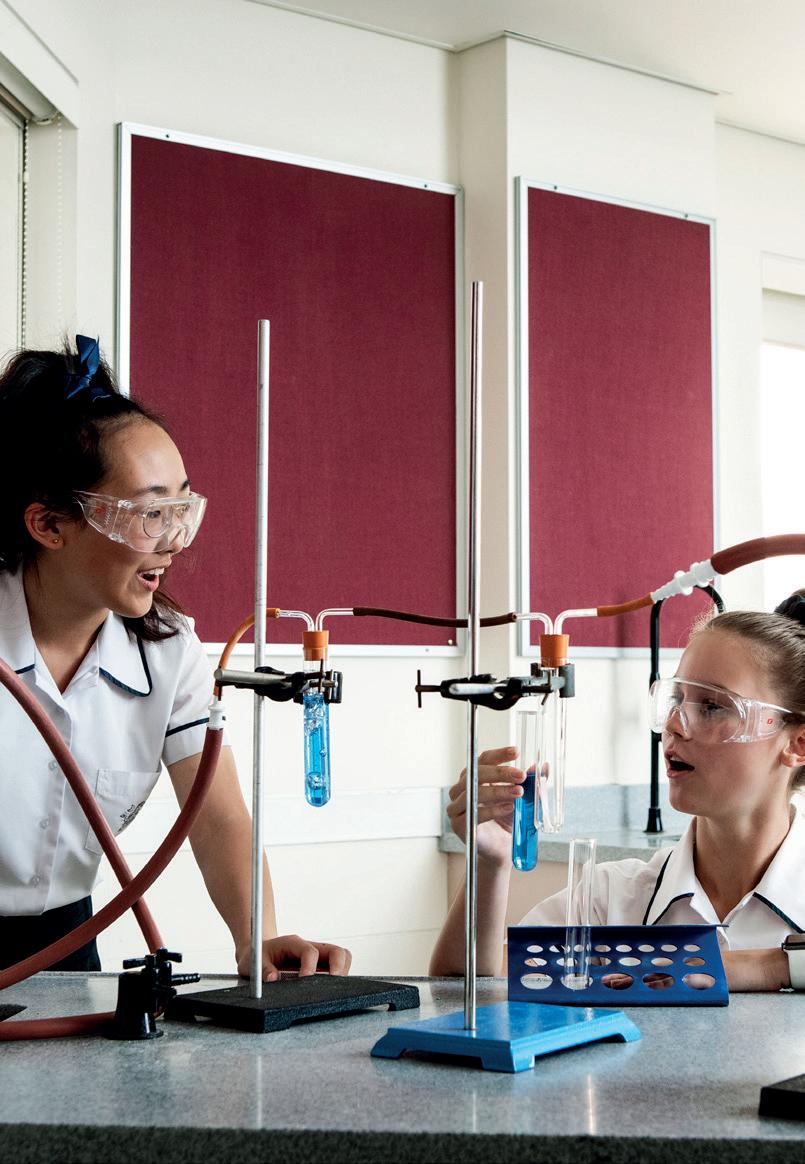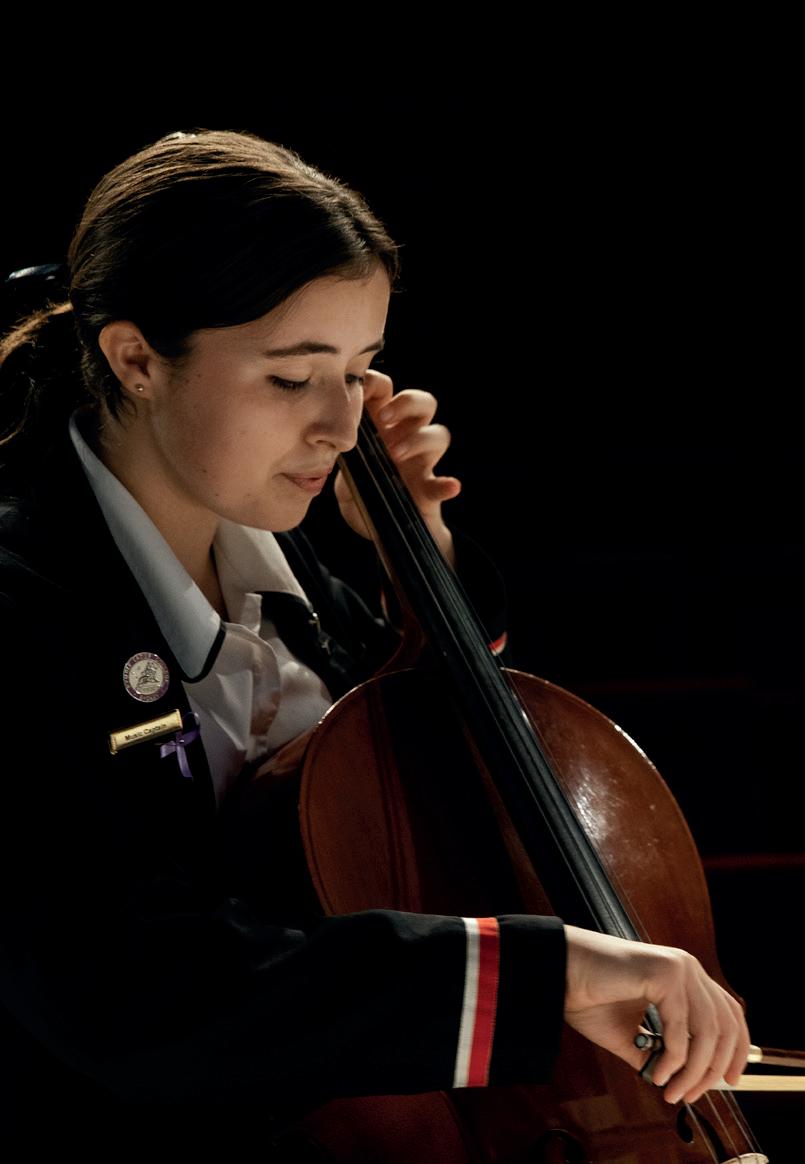
Year 11 2023 Subject Selection Information Evening THURSDAY 16 JUNE 2023 Year 11 Subject Selection Information Evening TUESDAY 13 JUNE 2023 Subject choice for the Higher School Certificate Year 11 course – 2024 | HSC course – 2025




YEAR 11 SUBJECT SELECTION INFORMATION EVENING
6.45PM
GILLIAN MOORE CENTRE FOR PERFORMING ARTS
WELCOME AND GENERAL INTRODUCTION
Head of Senior School
Mrs Nikki Wyse
Head of Upper School
Mr Tom Riley
7.10PM
GILLIAN MOORE CENTRE FOR PERFORMING ARTS
HIGHER SCHOOL CERTIFICATE SUBJECT SELECTION PROCESS
Director of Studies
Mrs Natasha Stanfield
7.20PM
COLONNADE
FUTURES AND CAREERS
Director of Futures and Partnerships
Mrs Kim Maksimovic
Futures Advisor
Ms Fiona D’Souza
Subject information booklet
Program
Subject Selection Discussions
HALL GENERAL ENQUIRIES
Head of Senior School
Mrs Nikki Wyse
Head of Upper School
Mr Tom Riley
Director of Studies
Mrs Natasha Stanfield
Director of Academic Excellence
Mr Jake Plaskett
HALL
CAREERS AND FUTURES ADVICE
Director of Futures and Partnerships
Mrs Kim Maksimovic
Futures Advisor
Ms Fiona D’Souza
HALL ENGLISH
Head of Learning Area
Mrs Amanda Reynolds
Courses offered
• English Advanced
• English Standard
• English Extension 1
• English Extension 2 (Year 12)
• English EAL/D
C9 MATHEMATICS
Head of Learning Area
Ms Catrina Kerr
Courses offered
• Mathematics
• Mathematics Standard
• Mathematics Extension 1
• Mathematics Extension 2 (Year 12)
C8 SCIENCE
Head of Learning Area
Mrs Kylie Cooley
Courses offered
• Agriculture
• Biology
• Chemistry
• Earth and Environmental Science
• Investigating Science
• Physics
• Science Extension (Year 12)
C5
HISTORY, SOCIETY AND ETHICS
Head of Learning Area
Ms Caragh Warth
Courses offered
• Ancient History
• Modern History
• History Extension (Year 12)
• Legal Studies
• Society and Culture
• Aboriginal Studies
• Studies of Religion (1 unit)
4 YEAR 11 SUBJECT SELECTION INFORMATION EVENING 2023
C10 GEOGRAPHY, BUSINESS STUDIES, ECONOMICS
Head of Learning Area
Mr Trevor Lucas
Courses offered
• Business Studies
• Economics
• Geography
C4
LANGUAGES
Head of Learning Area
Mrs Salina Bussien
Courses offered
• Chinese Continuers
• Chinese Extension (Year 12)
• French Continuers
• French Extension (Year 12)
• German Continuers
• German Extension (Year 12)
• Greek Continuers
• Italian Beginners
• Japanese Continuers
• Japanese Extension (Year 12)
• Latin Continuers
• Latin Extension (Year 12)
C2
PERSONAL DEVELOPMENT, HEALTH AND PHYSICAL EDUCATION
Head of Learning Area
Mrs Alison Cruz
Course offered
• Personal Development, Health and Physical Education (PDHPE)
C3
PERFORMING ARTS
Head of Learning Area
Mr Marcus Stafford
Courses offered
• Dance
• Drama
• Music 1
• Music 2
• Entertainment Industry (VET)
• Music Extension (Year 12)
C6 TECHNOLOGIES AND APPLIED STUDIES
Head of Learning Area
Mr Peter Ellis
Courses offered
• Design and Technology
• Food Technology
• Hospitality
• Software Engineering
• Textiles and Design
C7 VISUAL ART
Head of Learning Area
Mrs Brigiat Maltese
Course offered
• Visual Art
Further information
What is the required pattern of study for completion of
the HSC?
To be eligible for the award of the HSC, students are required by the NSW Education Standards Authority (NESA) to study at least 12 units in the Preliminary (Year 11) course and at least 10 units in the HSC (Year 12) course. Students must study a course that fits the following pattern:
1. At least six units from NESA Developed Courses (all courses offered at Pymble are NESA Developed Courses).
2. At least two units of English.
3. At least three courses (including English) of two units value or greater.
4. At least four subjects.
5. A maximum of six units of Science in Year 11 (Biology, Chemistry, Earth and Environmental Science, Physics) and seven units in Year 12 (including Science Extension).
What must a student do to satisfactorily complete the HSC course?
To satisfactorily complete the HSC course, NESA requires a student to:
1. Follow the Preliminary and HSC courses developed by NESA.
2. Apply herself with diligence and sustained effort to the set tasks and experiences provided in the course by the school.
3. Achieve the course outcomes.
4. Make a genuine attempt at the assessment tasks set for the course.
5. Sit for, and make a serious attempt at, the HSC examinations.
Which subjects should I choose to study?
There are four important points to bear in mind when considering which subjects to study:
1. Choose subjects that interest you and that you will enjoy studying.
2. Choose subjects and courses in line with your level of ability.
3. Choose subjects and courses that will provide the necessary background for any career paths you are considering. If you are unsure about future career areas, choose subjects and courses that will give you the greatest flexibility.
4. Listen to the information and advice given by your teachers.
NESA Advice for HSC Subject Selection
In addition, ensure that you do the following:
• Seek your teacher’s advice on whether you should be considering English Standard, English EAL/D, English Advanced or English Extension 1.
• If you wish to study Mathematics, ask your teacher for advice on whether you should choose Mathematics or Mathematics Standard. Also ask your teacher whether you should study Mathematics Extension 1.
• Read the Subject Information Booklet carefully so that you are clear about the subjects and courses being offered.
• Listen carefully to the Heads of Learning Area and your teachers about their particular subject area.
6 YEAR 11 SUBJECT SELECTION INFORMATION EVENING 2023
• Speak to your teacher, Head of Learning Area or Director of Student Learning if you have any questions. We are here to help you.
• Read the instructions on the Subject Choice Form carefully to ensure that you are choosing an appropriate combination of subjects.
The Australian Tertiary Admission Rank (ATAR) – An Overview
The Australian Tertiary Admission Rank is a number which provides a measure of a student’s overall academic achievement in the HSC in relation to that of other students. The ATAR is calculated solely for use by universities, either on its own or in conjunction with other selection criteria, to rank and select school leavers for admission to university. The ATAR is reported as a number between 0 and 99.95 with increments of 0.05.
The ATAR is based on an aggregate of scaled marks in ten units of ATAR courses comprising the best two units of English and the best eight units from the remaining units.
How your ATAR is calculated
Eligibility for an ATAR
To be eligible for an ATAR a student must satisfactorily complete at least ten units (including at least two units of English) of ATAR courses. Courses completed must include at least three NESA Developed Courses of two units or greater, and at least four subjects.
Which course should I study?
The choice of which course to study should NOT be determined by what is perceived to be the likely effect of scaling. Choice of which courses to study should be determined only by the interests, demonstrated abilities and the usefulness of the courses for the future career plans of the student concerned. The scaling process is designed to allow students to choose according to these principles and not, as far as university selection is concerned, be disadvantaged by their choice. It treats all students on their merits.
pymblelc.nsw.edu.au Avon Road Pymble NSW 2073 PO Box 136 North Ryde BC NSW 1670 Australia +61 2 9855 7799 A SCHOOL OF THE UNITING CHURCH ACN 645 100 670 | CRICOS 03288K 2022-CUR-4219





